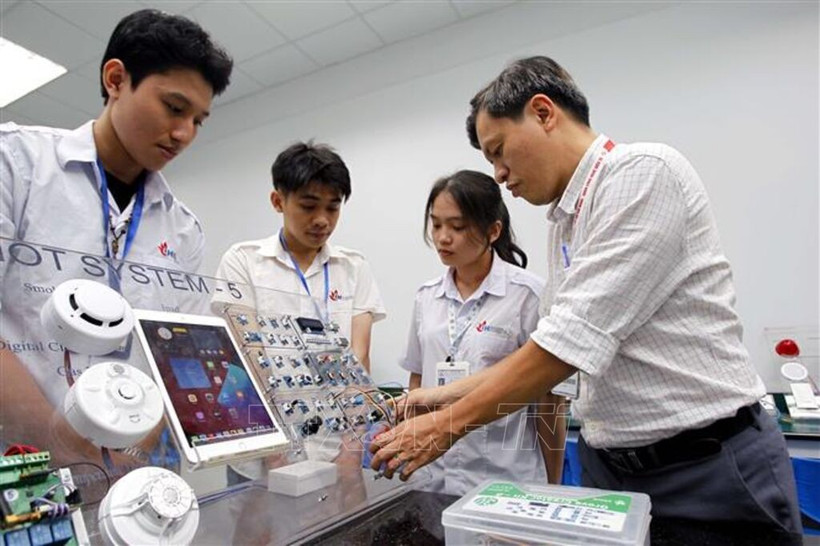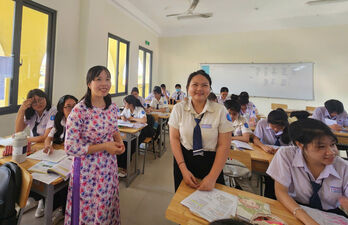
A lecturer from the Faculty of Electronics Technology at the Industrial University of Ho Chi Minh City guides students in study and research at the IoT and AI laboratory. (Photo: VNA)
Resolving faculty challenges
According to the Ministry of Education and Training, Vietnam had around 91,300 university lecturers as of 2024. Among them, roughly 30,000 hold doctorates, representing 33% of the total faculty, while nearly 58% possess master's degrees. Every year, the country appoints some 600 professors and associate professors, with the majority at major universities offering postgraduate programmes.
The Government set a target of having 40% of lecturers to hold doctorate by 2030. For universities offering doctorate programmes, that figure must reach at least 50% from 2030 onward. The challenge is formidable, given the five- to seven-year doctorate training programme and the ongoing “brain drain” with doctorates retiring or leaving academia.
Multiple measures to attract talent both inside and outside the countries have been carried out at higher education estabishments.
Under its “VNU 350” programme, the Vietnam National University, HCM City aims to lure 350 outstanding young scientists, offering funding of up to 200 million VND (8,000 USD) in the first years, a budget of 1 billion VND in the third year, and up to 10 billion VND (379,000 USD) in lab support in the fourth year. However, smaller universities struggle to recruit qualified doctors due to limited resources and less competitive income.
Director of the Ministry of Education and Training (MoET)’s Teachers and Educational Managers Department Vu Minh Duc affirmed that lectures are the centre of the higher education system, adding they are not only educators but also mentors, researchers, and bridges between academia and society.
Resolution No.71 underscores the need for preferential policies and special mechanisms to mobilise high-quality human resources for the sector, encourage experts and scientists to engage in higher education. It targets recruitment of at least 2,000 overseas lecturers. According to Duc, the ministry is drafting new salary and allowance frameworks to make academic careers more attractive, alongside regular health care, training and regional incentive packages.
Improving quality of scientific research
Director of the MoET’s Information Technology Department Pham Quang Hung revealed that the number of publications in reputable international journals rises 12–15% annually. Between 2018 and 2022, Vietnam produced over 76,600 Scopus articles. Vietnamese international publications span 27 specialties across four main fields of natural sciences, engineering – technology, life sciences – medicine, and social sciences.
The Vietnam National University, HCM City took the lead with more than 3,000 articles last year, followed by the Hanoi University of Science and Technology and the Vietnam National University, Hanoi, with around 1,500-1,600 each. Private universities such as Ton Duc Thang, Phenikaa, and Duy Tan, are also making their mark, contributing hundreds of international papers annually.
Despite the progress, the commercialisation of the research results remains limited. While universities contribute the majority of Vietnam’s international publications, research revenues are modest, with many State-funded projects failing to reach the market due to legal barriers and weak business linkages. The Vietnam National University, HCM City earned just 241.2 billion VND from science and technology services in 2024 as compared to 319 billion VND in 2022 and 288 billion VND in 2023.
To strengthen the role of science, technology, and innovation in higher education, Hung stressed the need for a new funding model for sci-tech activities based on research capacity and priority sectors.
He underscored that that amidst university autonomy, diversifying revenue sources, especially through partnerships with business and society, with be the most breakthrough driver of innovation.
The State, he added, must play an enabling role by issuing support policies and mechanisms, investing in infrastructure for cooperation activities, and selecting universities and enterprises with potential to pioneer effective cooperation models that could be scaled up later./.
VNA
Source: https://en.vietnamplus.vn/scientific-research-capacity-a-cornerstone-to-elevate-higher-educations-quality-post327123.vnp
 Building a positive education environment
Building a positive education environment



